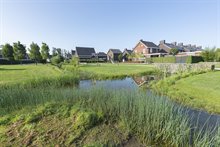National strategy
National climate adaptation efforts are largely being pursued under two programmes: the National Climate Adaptation Strategy (NAS) and the Delta Programme for Spatial Adaptation (DPRA). In addition, the Freshwater Delta Programme also touches upon climate adaptation: climate change is facing us with increasingly frequent drought, which forces us to take a more efficient approach to our freshwater supplies. This page outlines these three national programmes.
What is the National Climate Adaptation Strategy?
The National Climate Adaptation Strategy (NAS) is the overarching Dutch strategy in the field of climate adaptation. The strategy sets out the main climate risks for the Netherlands and plots the course for addressing these risks from various sectors.
What is the Delta Programme for Spatial Adaptation?
The Delta Programme for Spatial Adaptation (DPRA) is working on the task of redesigning the Netherlands in a manner that will enable us to cope with the consequences of increasing heat, drought, severe precipitation, and flooding. This is referred to as a climate-proof and water-resilient design. The Delta Programme for Spatial Adaptation is a component of the national Delta Programme and comprises a Delta Decision and a Delta Plan.
What is the Freshwater Delta Programme?
Under the Freshwater Delta Programme, the national government is collaborating with various parties on the goal of enabling the Netherlands to cope with freshwater shortages, as prolonged periods of drought may compromise the availability of sufficient freshwater. The Freshwater Delta Programme, like the Delta Programme for Spatial Adaptation, is a component of the national Delta Programme and also comprises a Delta Decision and a Delta Plan.
